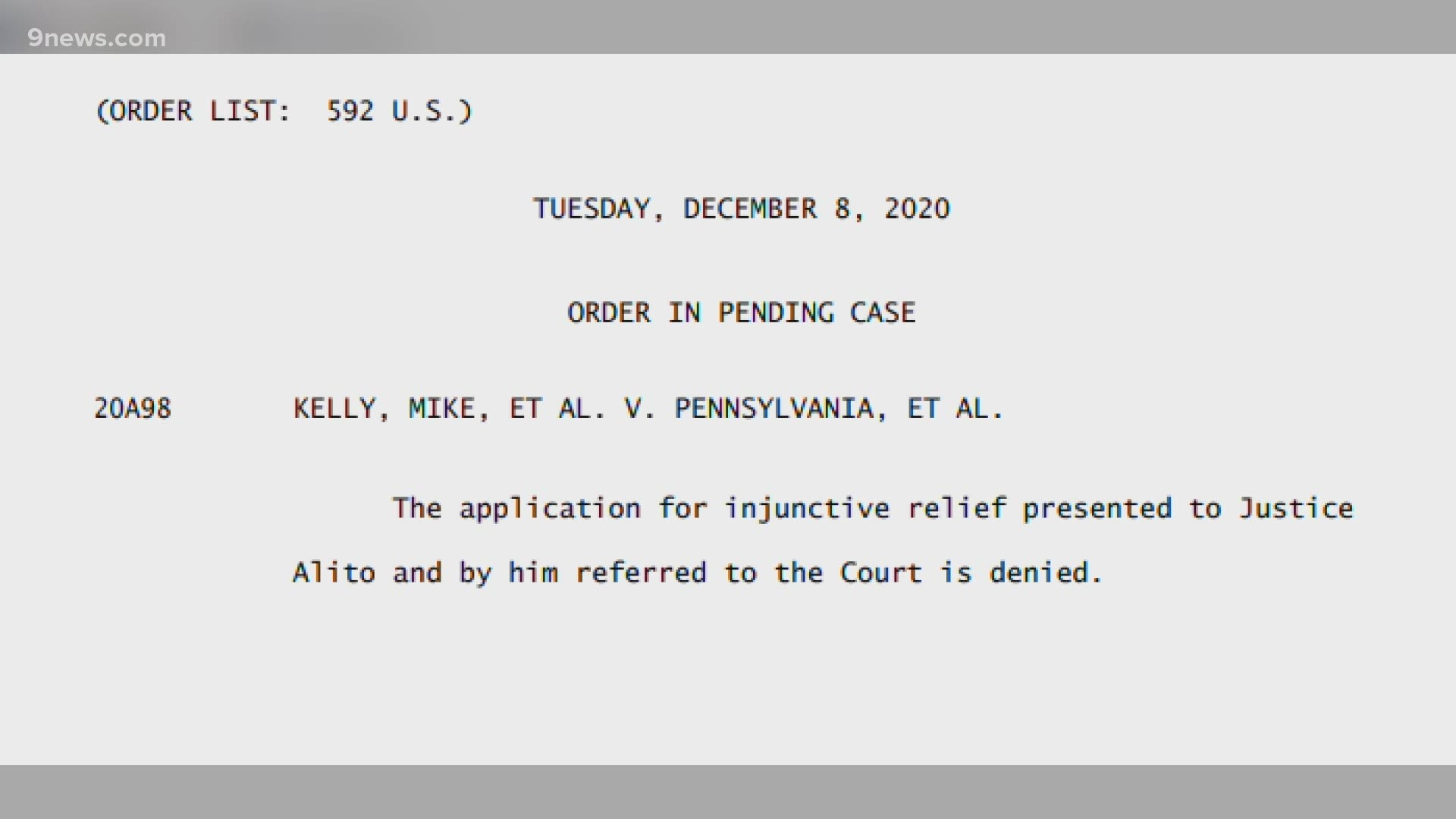AUGUSTA, Maine — Editor's Note: The above video is from NEWS CENTER Maine's sister station KUSA, based in Denver, Colo.
Maine Attorney General Aaron Frey has joined a coalition of 23 attorneys general in urging the U.S. Supreme Court to reject Texas Attorney General Ken Paxton’s request to overturn election results in four key states.
Paxton’s lawsuit, filed against Georgia, Wisconsin, Michigan, and Pennsylvania, says the states exploited the COVID-19 pandemic to justify ignoring federal and state election laws. It also says the states enacted last-minute changes, skewing the results of the 2020 general election.
Seventeen states with Republican Attorneys General have told the Supreme Court they support Paxton’s lawsuit, which could reverse President-elect Joe Biden’s victory.
In an amicus brief led by District of Columbia Attorney General Karl A. Racine, filed in Texas v. Pennsylvania, the coalition argues that Texas’s unprecedented suit depends on a misreading of the Constitution’s Electors Clause—one that clashes with a century of precedent, denies states’ power to make their own decisions about election administration and oversight, and threatens to upend the basic notions of federalism and states’ rights.
The brief argues the suit depends on specious claims of voter fraud, offering no evidence whatsoever of systemic fraud in the November election. The coalition is asking the court to throw out Texas’s suit against the four states.
RELATED: President Trump says he will join Texas Attorney General's motion to overturn Biden victory
“The attempt by Texas to selectively invalidate the votes of other states based on nothing more than unsubstantiated allegations and political animus represents a new attempt at voter suppression,” Frey said in a release Friday. “Both Republican and Democratic officials in the states targeted have repeatedly confirmed that the election results were not affected by fraud. I would not tolerate another state trying to silence Maine voters, which is why I joined the request for the Supreme Court to reject this case.”
The U.S. Department of Homeland Security said the 2020 election was “the most secure in American history.”
Biden won the four states by "decisive" margins, the coalition says, and recounts in Wisconsin and Georgia confirmed the results.
Election officials in all 50 states and the District of Columbia have certified their election results.
While Biden is projected to win 306 electoral votes when the Electoral College meets, if he is denied Georgia, Wisconsin, Michigan, and Pennsylvania's voted based on Paxton's motion it would bring him below the 270 needed to win.
The 23-Attorney General coalition’s brief filed Friday urges the Supreme Court to deny Texas’s lawsuit because:
- Texas’s interpretation of the Electors Clause is contrary to a century’s worth of precedent: The Electors Clause of the Constitution grants the states the power to set their own rules for presidential elections held within their own states. While the text of the Constitution says this authority is given to “state legislatures,” since the early 20th century, the Supreme Court has allowed the legislatures to delegate this authority to elections administrators or other state government entities.
- States have a constitutional right to determine the process for administering their own elections: Federalism is a core component of the Constitution, governing a division of power between the states and the federal government. The Constitution makes clear, and the Court has affirmed, that the Framers granted the States the right to administer and oversee presidential elections on their own. Yet Texas’s lawsuit—calling on the Supreme Court to intervene in the elections held by the four defendant states—would infringe on that right, and thus, their sovereignty. Further, it would set its own destructive precedent limiting the States’ ability to make critical changes to the structure and oversight of elections.
- There is no evidence that the states’ common-sense measures to protect the vote and the health of residents produced significant voter fraud: Since 2000, more than 250 million people in all 50 states have voted using mail-in ballots, and in 2018 alone, more than 31 million Americans—or about 25.8 percent of voters—cast their ballots by mail. Moreover, five states—Colorado, Hawaii, Oregon, Utah, and Washington—already have all-mail voting systems where every registered voter receives a ballot in the mail. Despite the prevalence of voting by mail, officials at the state and federal level have consistently found no evidence of widespread fraud. That remained true for the 2020 election. Despite President Trump’s claims that the results were tainted by voting fraud, his campaign lawyers and other allies have consistently failed to substantiate these assertions with any evidence. Indeed, Republican and Democratic officials overseeing the elections in all four defendant states have repeatedly confirmed that these processes were safe and secure.
AG Racine led the amicus brief joined by AG Frey, along with Attorneys General from the States and Territories of California, Colorado, Connecticut, Delaware, Guam, Hawaii, Illinois, Maryland, Massachusetts, Minnesota, Nevada, New Jersey, New Mexico, New York, North Carolina, Oregon, Rhode Island, Vermont, Virginia, U.S. Virgin Islands, and Washington.
Maine Independent Sen. Angus King tells NEWS CENTER Maine he supports Frey's effort to oppose the "dangerous" and "baseless" attempt to overturn the election results.
“I’ve disagreed with many of President Trump’s policy decisions, but his outgoing act may be his most damaging to the nation," King said in a statement Friday. "Rather than gracefully accepting defeat, he is launching inaccurate claims of fraud and undermining voters’ confidence in our electoral process – the very backbone of our system of government. I support Attorney General Frey’s effort to oppose the dangerous, baseless attempt to overturn the will of American voters, and urge all Americans to choose the long-term health of our country over short-term political squabbles.”
The Electoral College will meet Monday to cast their votes.
Sen. Susan Collins did not immediately respond for comment.
The Associated Press contributed to this report.

